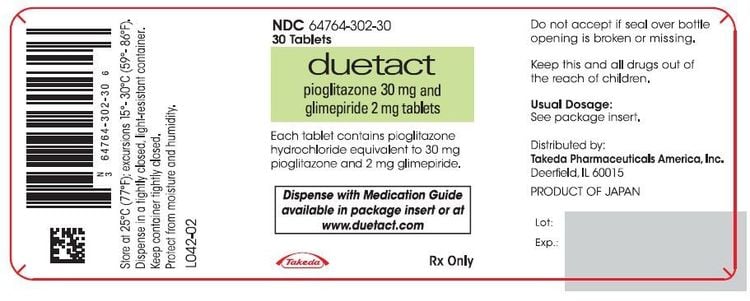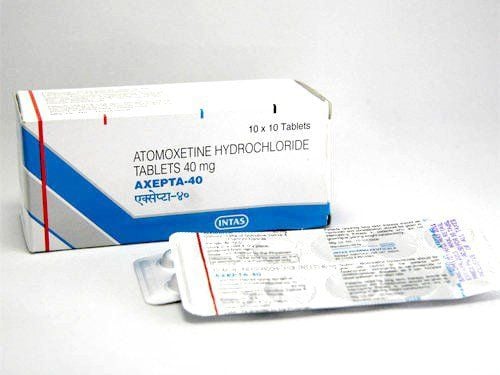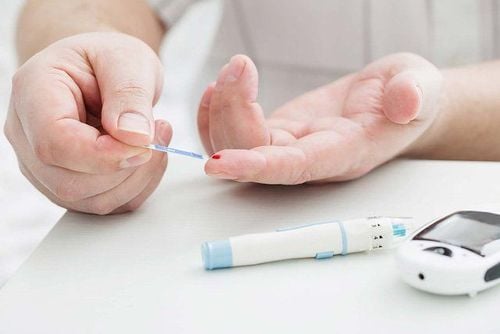This is an automatically translated article.
Duetact is a combination product for the treatment of diabetes, distributed in the form of a white, round, tablet. The 30 mg-2 mg type is imprinted with the symbols "30/2" and "4833G" on both sides. The 30 mg-4 mg type is imprinted with the symbols "30/4" and "4833G" on both sides.
1. What is Duetact? What does Duetact do?
Many people today do not know “What is Duetact?” or “What does Duetact do?”, in fact, Duetact is a combination of 2 drugs, pioglitazone and glimepiride, specifically:
Pioglitazone belongs to the thiazolidinediones or "glitazones" class of drugs, which work by helping to restore the response. body's response to insulin, thereby lowering blood sugar levels. Glimepiride belongs to a class of drugs called sulfonylureas, which work by releasing the body's natural insulin. Currently, the prescription drug Duetact is used to control high blood sugar in patients with type 2 diabetes, but requires it in conjunction with an appropriate diet and exercise schedule. Controlling high blood sugar will help prevent:
Kidney damage; Blind; Nervous problems; Loss of limbs; Problems with sexual function. In particular, good management of diabetes can also reduce the risk of having a heart attack or stroke.
2. Duetact . User Manual
Read the medication leaflet provided by your pharmacist before you start taking Duetact and each time you get a refill. If you have any questions, ask your doctor or pharmacist. Take this medicine once a day with the first main meal of the day or as directed by your doctor. Dosage is based on your medical condition and response to treatment. You may have to wait 2 to 3 months for the medicine to take full effect. Colesevelam may decrease the absorption of glimepiride. So if you are taking colesevelam, take Duetact at least 4 hours in advance. Using Duetact regularly helps you get the most benefit. It is recommended to take the medicine at the same time every day, in combination with regular blood sugar monitoring and sharing the results with your doctor. When switching from individual diabetes medications to a combination product like Duetact, your doctor may ask you to check your blood sugar more often to make sure you don't have a hypoglycemic reaction (a condition in which your blood sugar levels are low. sudden low when first taking the drug). In general, users should strictly follow the doctor's instructions.
3. Side effects when using Duetact
Sometimes using Duetact can lead to some of the following side effects:
Headache; Dizzy; Diarrhea ; Nausea; Muscle pain; Sore throat; Dental problems. If any of these side effects persist or get worse, tell your doctor or pharmacist right away.
Before prescribing Duetact, your doctor has evaluated that the benefit to you outweighs the risk of side effects. So you can rest assured that there are still many people using this medication without serious side effects. Tell your doctor right away if you experience serious side effects after taking Duetact, including:
Vision problems, for example: Color disturbances or decreased night vision; Fracture ; Red/dark urine; Urgent need to urinate; Pain when urinating; Anorexia; Yellow eyes or skin; Mental/mood changes, eg: Hallucinations, confusion; Convulsions; Easy bruising/bleeding; Signs of infection, e.g. fever, persistent sore throat. Duetact can cause low blood sugar (hypoglycemia), especially if you don't consume enough calories from food or exercise too hard. Symptoms include:
Cold sweats; Blurred vision; Dizzy ; Sleepy; Trembling; heart palpitations; Headache; Faint; Tingling in the hands/feet; Hungry. Carrying a glucose medication for quick treatment of low blood sugar is a good habit. If you don't have a glucose tablet or gel, you can also raise your blood sugar quickly by eating a sugar source, like spiced sugar, honey or candy, and drinking fruit juice or sugary soda. Don't forget to tell your doctor about this reaction. To prevent hypoglycemia, you need to eat meals on a regular schedule and do not skip meals. Ask a health professional for advice on effective remedies if you have missed a meal.
Symptoms that indicate high blood sugar include:
Thirst; Urinating a lot; Confusion; Sleepy; Face flushed; Rapid breathing; Breath has a fruity smell. If these symptoms occur, tell your doctor right away so that your dose can be increased.
Rarely, very serious allergic reactions to Duetact have been reported. However, seek medical attention as soon as possible if you notice symptoms of a serious allergic reaction, including:
Skin rash; Itching or swelling of the face, tongue, or throat; Severe dizziness; Shortness of breath. Also, if you notice other side effects of Duetact not listed above, contact your doctor/pharmacist for assistance.

Sử dụng thuốc Duetact thường xuyên sẽ giúp bạn nhận được nhiều lợi ích nhất
4. Precautions while using Duetact
Before taking Duetact, tell your doctor or pharmacist if you are allergic to:
Pioglitazone or glimepiride; Other glitazones, eg rosiglitazone; Other sulfonylureas, eg glipizide, tolbutamide; Any other allergic condition. This product may contain inactive ingredients, cause allergic reactions or other problems, so you should ask your pharmacist for more details.
Your doctor or pharmacist also needs to know your medical history before prescribing medicine, especially of:
Heart problems, for example: Congestive heart failure; Fluid in the lungs; Swelling due to edema, fluid retention; liver problems; Kidney disease; Thyroid problems. Hormone-related conditions: Adrenal/pituitary insufficiency, syndrome of inappropriate antidiuretic hormone secretion (SIADH); Mineral imbalance, eg: Hyponatremia; Anemia; Eye problems, eg: Retinopathy; Bladder cancer. You may experience blurred vision, dizziness, or drowsiness because your blood sugar is too low or too high. Therefore, do not drive, operate machinery, or perform any activity that requires alertness and clear vision until you are sure you can be safe.
Limit alcohol consumption while taking Duetact to avoid increasing the risk of hypoglycemia.
Blood sugar can be more difficult to control when the body is under stress due to: Fever; Infection; Injury; Surgery...In these cases, consult your doctor for a change in your treatment plan, prescription, or blood sugar test.
Duetact may make you more sensitive to the sun, so you should:
Reduce your time in the sun; Avoid tanning and ultraviolet lights, extremely bright lights for filming; Always use sunscreen and wear protective clothing when outdoors. Tell your doctor right away if you get a sunburn or develop blistering or redness on your skin.
Duetact may increase the risk of fractures in female patients, such as fractures of the upper arm, hand, foot, or ankle. To reduce your risk of injury, exercise caution when performing vigorous activities, such as contact sports.
Kidney function declines with age, whereas Duetact is filtered by the kidneys. Therefore, the elderly are more at risk of hypoglycemia if using this drug.
Duetact may also cause changes in the menstrual cycle, promoting ovulation in women with certain fertility problems. Therefore, women of childbearing age should use an appropriate method of contraception while taking this medicine.
During pregnancy, Duetact should be used only when clearly needed. Pregnancy can be both a cause and an exacerbating factor of diabetes. Discuss a plan with your doctor to control blood sugar during pregnancy. Your doctor may use insulin as an alternative to Duetact during pregnancy. If still using Duetact, pregnant women can be switched to insulin at least 2 weeks before their due date to avoid the risk of hypoglycemia in the newborn. Discuss with your doctor the risks and benefits of taking Duetact during pregnancy.
It is not known whether this medicine passes into breast milk, as well as any undesirable effects on a nursing infant. Therefore, women are not recommended to breast-feed while taking this medicine.
5. Interactions between Duetact and other drugs
Drug interactions can change the way Duetact works or increase the risk of serious side effects. You should make a list of all the products you are using and share it with your doctor or pharmacist. Do not start, stop, or change the dose of any medicine without your doctor's consent.
Other drugs can affect how pioglitazone is eliminated from the body, affecting how pioglitazone works. Examples include:
Gemfibrozil; Rifamycins, such as rifampin. Beta-blockers (such as metoprolol, propranolol, glaucoma eye drops such as timolol) can stop the rapid heart rate when blood sugar drops too low. Therefore, care should be taken when using it.
Many medications can affect blood sugar levels, making it harder for you to control your diabetes. So before starting, stopping or changing any medicine, discuss it with your doctor or pharmacist carefully. You also need to check your blood sugar as often as directed, then share the results with your doctor. In particular, tell your doctor right away if you have symptoms of high or low blood sugar. Your doctor may adjust your diabetes medication, exercise schedule, or diet.

Thuốc Duetact có thể làm tăng nguy cơ gãy xương ở bệnh nhân nữ
6. Some other notes when using Duetact
6.1. Overdose Call 911 if you have overdosed on Duetact and have the following symptoms:
Fainting or difficulty breathing (severe); Trembling; heart palpitations; Sweat; Loss of consciousness. 6.2. Missed dose In case you forget a dose of Duetact, take it as soon as you remember. But if it is almost time for your next dose, you can skip the missed dose. Take the next dose at the usual time and do not need to double the dose.
6.3. Storage Store Duetact at room temperature, away from light and moisture, away from children and pets. Do not store medicine in the bathroom.
6.4. Note Do not share Duetact with others. While you are taking Duetact, you should have routine tests done, such as kidney/liver function tests, fasting blood sugar, hemoglobin A1c, complete blood count.
Overall, effective diabetes management includes taking your medications on schedule, eating a healthy diet, exercising properly, and getting regular checkups. Balanced meals should contain adequate calcium and vitamin D, stop smoking and limit alcohol.
Please dial HOTLINE for more information or register for an appointment HERE. Download MyVinmec app to make appointments faster and to manage your bookings easily.
Reference source: webmd.com












